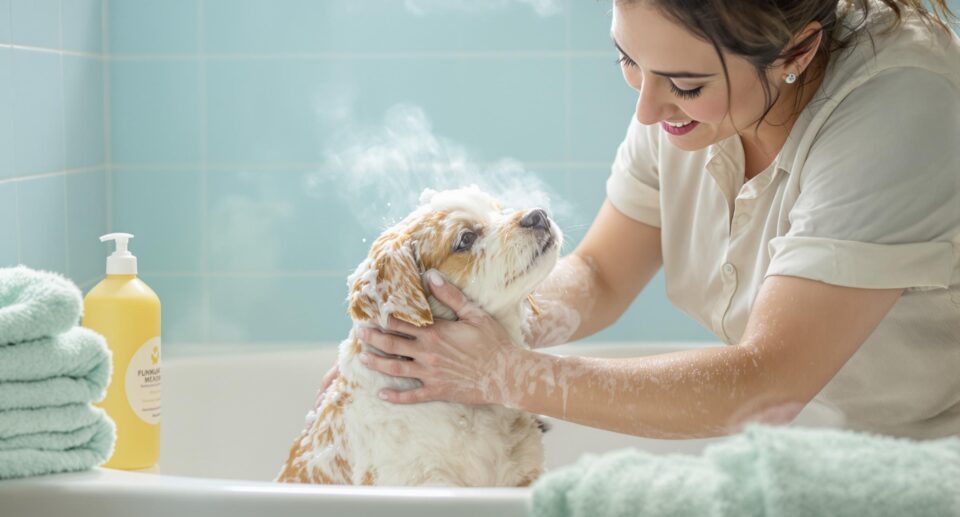Eliminating Dog Odor

Getting rid of pet odors
Offensive pet odors are signs of underlying health problems and should not be ignored or covered up. Resolve your pet’s health problems and remove pet odors so your pet remains part of the family rather than being shunned. Treatment keeps pets more comfortable and relaxed. There is no doubt that with noses millions of times more sensitive to odors than ours, our pets are affected physically and emotionally by unhealthy odors. Their appreciation of the healthy aroma of horse manure is another matter.
Skin odors in pets
Treating pet odors is a complex process. Some pet odors are chemically bound to skin and hair so that simple shampooing does not remove them. And some pets have thick clumps of debris (seborrhea) that need to be removed. For these conditions, use shampoos that open pores and loosen keratin, such as Vet Solutions Universal Medicated Shampoo.
Pets with thick clumps of skin and oil (seborrhea) or chemically bound odors that also have skin infections should be washed twice: first with shampoos that open pores or lift debris, then with shampoos that control fungal infections, yeast, or bacteria, such as Malaseb or Be Super Clean. Give the skin a good scrubbing, your pet will love it, and make sure to wash out all the shampoo when you are done. Residual shampoo can also make your pet itch and smell.
How often a stinky pet should be bathed depends upon the cause of the odor. Pets with hot spots, pyoderma, skin fold infections, anal fistulas, fecal or urinary incontinence, do best when involved areas are bathed daily with medicated shampoos such as Malaseb or Medicated Shampoo. In some cases, your veterinarian will prescribe topical medications to be applied after bathing.Pets with offensive odors due to kidney disease, hypothyroidism, or age-related changes, improve with weekly baths. Bathing includes shampooing, rinsing thoroughly, and drying. Shampoos that clean but do not dry the skin are best: Oatmeal & Aloe Vera Shampoo and Epi-Soothe. Towel drying is preferable to using blow driers that heat and damage skin and hair and further set malodorous chemical stinks into the coat.
Unhealthy skin odor caused by cancer is difficult to control. With cancerous tumors that destroy the skin, underlying tissues become infected. Topical and systemic antibiotics are of limited use. Some pets with cancer benefit from surgery, chemotherapy, and radiation. Most pets with cancer benefit from supplements that boost the immune system, such as Be Well with organic green tea and organic flax. Super VitaChew Chewable Tablets for Dogs has a good concentration of antioxidants to benefit the immune system.
Clipping pet’s hair can reduce odor
Whenever there is a malodorous skin infection, clipping your pet’s hair helps alleviate the odor and make the infection easier to treat. This is especially true with long-haired cats infected with fungal ringworm. In addition to making it easier to treat and visualize problem areas, clipping makes it easier for the skin to dry. Dry skin is more resistant to fungal, yeast, and bacterial infections than is damp skin. Another reason to clip is that clipping makes shampoos, conditioners, and medications go further.
In some cases, though, clipping can make skin problems worse. This occurs when the clipper blade is run so close to the skin that it irritates the skin leaving red, itchy, inflamed skin (dermatitis) and hair follicles (folliculitis). So, clip, but don’t clip too closely.
Some dog breeds, such as Alaskan Malamutes and Siberian Huskies with Northern genetics, grow and shed their coats only once a year or once every two years. When these dogs are clipped, their coats may remain short for many, many months.
Treating ear odors
Pet odors of the ear are resolved when cerumen, bacteria, yeast, and moisture are removed. To remove debris use PetMeds Ear Cleansing Solution or Epi-Otic Advanced Ear Cleanser. To control bacteria and yeast remove debris then use Otomax or Baytril Otic as recommended by your veterinarian.Another method of cleaning and medicating ears requires only one product: Zymox. Zymox contains enzymes that dissolve material and create an environment inhospitable to bacteria and yeast. If your pet’s ears are intensely itchy, use Zymox with Hydrocortisone, which contains a steroid in addition to enzymes.
Improvement in odor of the ear and discharge will be temporary if your pet’s ear inflammation (otitis) is caused by food allergies. How common is this? Very common. Food allergies are the number one reason dogs develop smelly, yeasty ear infections. To avoid reoccurring ear infections, eliminate problem foods. Use a commercial hypoallergenic diet or try a homemade diet food trial.
Treating mouth odors
Brushing teeth for 2 minutes every day and visiting the veterinary dentist are the best methods of resolving pet odors of the mouth. The best pet toothpaste is C.E.T. Enzymatic Toothpaste because it has enzymes to control bacteria and a flavor pets love. Toothpaste flavor is important because you want your pet’s cooperation with this. Brushing is especially important in senior pets. Read our tips on how to brush your pet’s teeth.
If mouth odor is caused by bleeding stomach ulcers, the odor will not resolve unless the ulcers are treated. Pets on prescription nonsteroidal anti-inflammatory drugs (NSAIDs) such as Rimadyl and Metacam, may develop gastrointestinal (GI) ulcers. Your veterinarian will immediately recommend switching your pet to another medication and may prescribe stomach coating medications such as Sucralfate. In some cases, ulcers can be prevented by lowering the NSAID dose or the frequency with which it is given. For example, pets taking NSAIDs for arthritis may lower their need for NSAIDs if they take cartilage and joint protecting medications (chondroprotectives). Super Joint Enhancer and T-Relief are ideal for pets with arthritis.
If mouth odor is caused by kidney failure or polycystic kidney disease, every effort is made to support the kidneys. Your veterinarian will recommend a diet of moderate protein, supplements with Omega 3 fatty acids, subcutaneous fluids, and herbs such as rehmannia. The most helpful Omega 3 fatty acid supplement is Nordic Naturals Omega 3-Pet, an extraordinarily pure product. Purity is of primary importance in pets with poorly functioning kidneys. For pets allergic to fish, use Be Well or Missing Link.
Odors caused by allergies
Allergic pets can be plagued with stinky problems: skin infections and hot spots due to fleas, frequent yeasty skin infections, inflammatory bowel disease, diarrhea and flatulence. Among the prescription medications for allergies are Prednisone, Cyclosporine, and Hydroxyzine HCL. Among the nonprescription medications are Yucca Intensive or HomeoPet Hot Spots. If your pet has hot spots or itchy infected skin, the number one cause is an allergic reaction to fleas. Use Frontline Plus or Advantage II. It’s absolutely essential to prevent fleas in these pets because flea saliva stimulates allergic skin reactions. Treating the home and yard removes the flea reservoir where 90% of fleas reside.
For allergies that affect the gastrointestinal (GI) tract and cause inflammatory bowel disease, flatulence, and diarrhea, it’s essential to calm the immune system and eliminate any allergy-causing foods. Some pets do well switching to a premium food, such as Taste Of The Wild. Repopulate the intestines with healthy bacteria to normalize the stools and help control flatulence with Fast Balance-GI. Pets with GI allergy symptoms also benefit from Yucca Intensive. Yucca is an herb that works like a steroid and controls inflammation. It dramatically reduces flatulence. Yucca Intensive can also be applied topically to treat hot spots and inflammatory skin problems.
Anal odors in pets
Pet odors from the anus are caused by several different problems, all of which require frequent washing and drying to remove feces and bacteria. Use antibacterial shampoos, such as Vet Solutions Universal Medicated Shampoo. If the odor is generated from the anal sacs, which many call anal glands, have your veterinarian empty them. Insert Hemorrhoid Suppositories every few days to release a healing homeopathic medication into the area. These suppositories do not induce defecation. Address the possibility of food allergies because allergies are the number one cause of an itching rear end, scooting, inflammation, and reduced draining from anal sacs.
Anal fistulas are aggravated by tail clamping which creates a dark warm space that bacteria thrive in. For dogs that clamp their tails because they are anxious, use calming techniques. Prevent diarrhea because the loose stool increases bacterial contamination. Supplement with Fast Balance-GI to promote healthy intestinal bacteria. These bacteria make it difficult for infections that cause diarrhea to become established.





